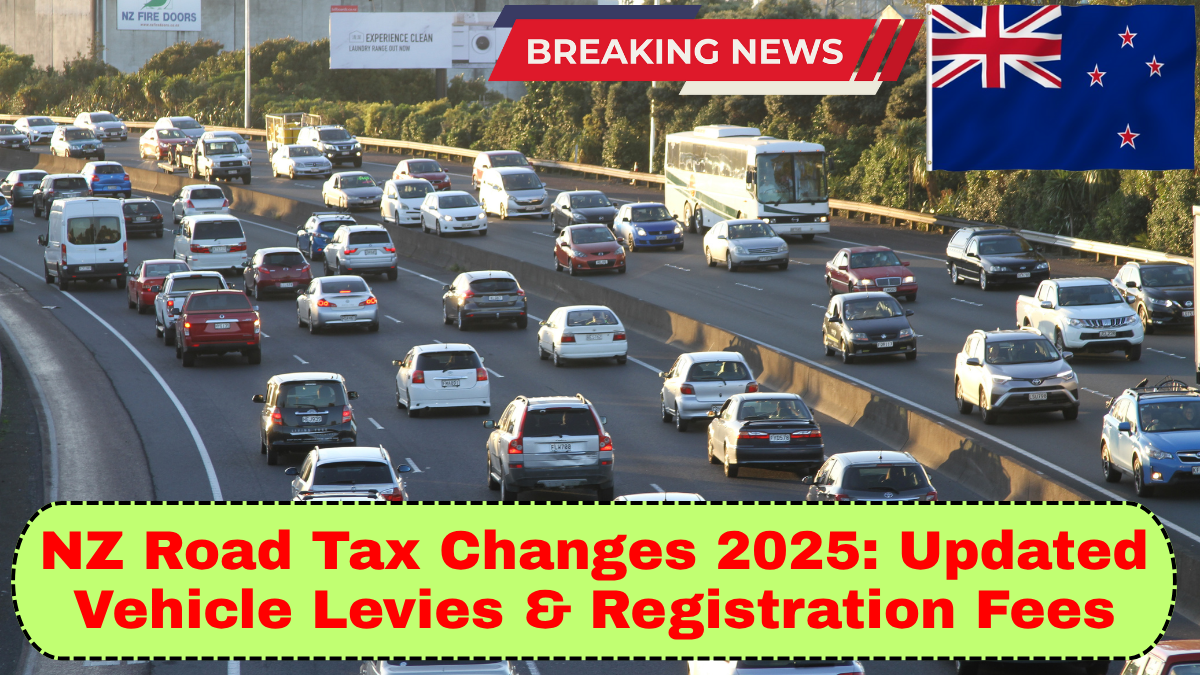As New Zealand gears up for significant updates in its transportation policy, the NZ Road Tax Changes 2025 are set to reshape the cost of owning and operating a vehicle. These updates are part of the government’s broader efforts to support sustainable transport, reduce carbon emissions, and ensure fair contributions from all road users.
Here’s a detailed breakdown of the changes coming to vehicle levies and registration fees, along with what it means for drivers, businesses, and the automotive industry as a whole.

Why Are These Changes Happening?
The Ministry of Transport and Waka Kotahi NZ Transport Agency have emphasized the need for a modernized road tax system that reflects New Zealand’s environmental goals and evolving vehicle technologies. The current model, largely unchanged for over a decade, no longer aligns with today’s vehicle usage patterns, especially with the rise of electric and hybrid vehicles.
These road tax updates aim to:
- Promote lower-emission vehicle usage
- Fund road maintenance more fairly
- Align with the Government’s Emissions Reduction Plan
Key Changes to Vehicle Levies in 2025
One of the most talked-about aspects of the NZ Road Tax Changes 2025 is the restructuring of the vehicle levy system. Levies will now be assessed more dynamically based on:
- Emissions Profile: High-emission vehicles will face increased levies, while low or zero-emission vehicles (EVs and hybrids) will benefit from reduced charges.
- Vehicle Type and Usage: Commercial vehicles, heavy freight trucks, and high-usage vehicles may see higher levies to reflect their greater impact on road infrastructure.
- Fuel Type: Petrol and diesel vehicles will be levied differently, acknowledging the environmental cost of each fuel type.
Example:
A diesel-powered SUV may see an annual vehicle levy increase of up to $150, whereas a fully electric vehicle could see a decrease of $75 or more.
Adjustments to Vehicle Registration Fees
The second major update involves registration fees, which will be recalibrated to better reflect the true cost of road maintenance, regulatory services, and safety programs.
Key Fee Updates:
- Base registration fees will increase by an average of 10-15%.
- Safety and inspection surcharges may be applied to older vehicles (10+ years old) to encourage fleet renewal.
- A digital processing fee will be introduced for online vehicle transactions.
These changes aim to create a more self-sustaining system, reduce the taxpayer burden, and ensure that those who use the roads the most pay their fair share.
Impact on EV and Hybrid Owners
Electric vehicle owners have enjoyed several incentives in recent years, including exemption from road user charges (RUCs). However, under the 2025 changes:
- Light EVs will start paying RUCs, phased in over two years.
- Despite this, registration fees for EVs remain lower, and they will still benefit from lower vehicle levies.
This phased approach balances the need for infrastructure funding with the government’s goal to encourage sustainable transport choices.
What This Means for Fleets and Commercial Operators
For logistics and commercial operators, the NZ Road Tax Changes 2025 bring both challenges and opportunities:
- Increased costs for diesel and heavy-use vehicles
- Potential discounts for low-emission fleet conversions
- Greater administrative tracking needed to manage dynamic levies and RUC obligations
Businesses may consider transitioning to greener fleets to avoid higher levies and qualify for upcoming incentive programs.
Future-Proofing the Road Tax System
The 2025 overhaul is not the end of the road. Officials have signaled that this is the first step toward a fully usage-based taxation model, possibly incorporating real-time GPS tracking and mileage-based levies in the future. The goal is to create a fair, transparent, and environmentally aligned transport funding system.
Frequently Asked Questions (FAQs)
Q1: When will the NZ Road Tax Changes 2025 take effect?
A1: Most changes will be implemented from January 1, 2025, with some adjustments rolling out gradually through the year.
Q2: Will electric vehicles still be cheaper to run?
A2: Yes. Even with new RUCs, EVs will maintain lower total ownership costs compared to petrol or diesel vehicles due to lower fuel and maintenance expenses.
Q3: How can I calculate my new vehicle levy or registration fee?
A3: Waka Kotahi will release an online calculator by late 2024, allowing drivers to estimate new charges based on vehicle type, fuel, and emissions.
Q4: Are there exemptions for rural or low-income drivers?
A4: The government is reviewing support measures for vulnerable groups and may introduce targeted rebates or exemptions.
Q5: Can I avoid increased fees by switching vehicles?
A5: Yes. Choosing a low-emission or fuel-efficient vehicle can reduce both levies and registration costs.
click here to learn more